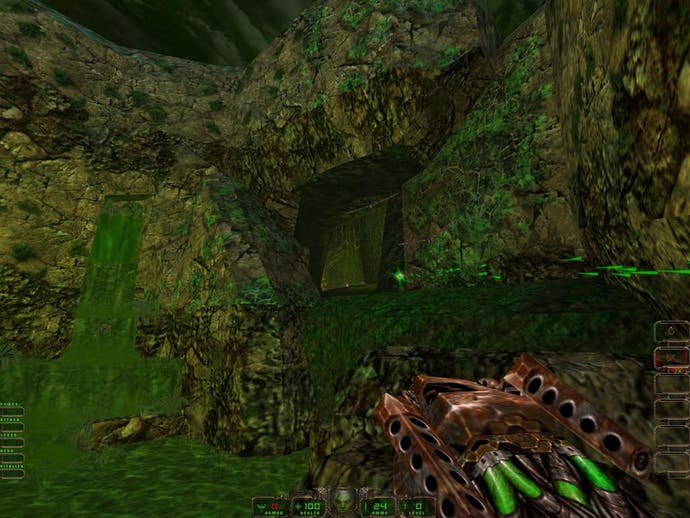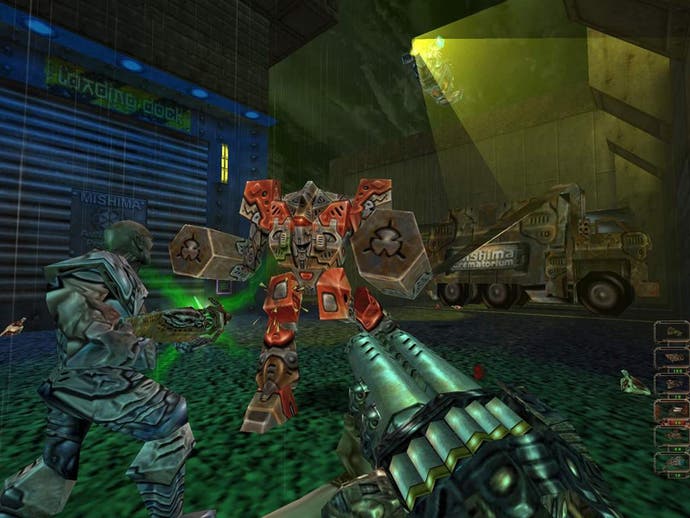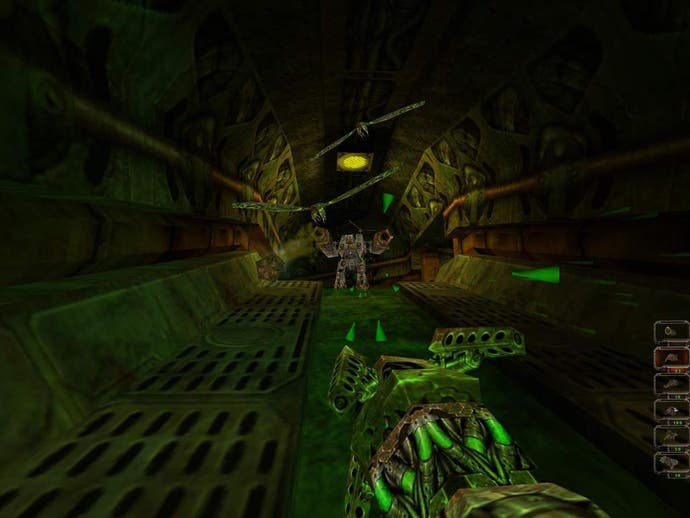Daikatana
John Romero's overdue FPS reviewed

If I Could Turn Back Time
An old man with a bizarre name and a clichéd heritage visits our samurai-teaching hero, called (funnily enough) Hiro Miyamoto. Via in-game cutscenes the old man relays the plot and your mission - to rescue his daughter and wield the time-travelling sword known as Daikatana against some dictatorial chap.
Then he gets capped.
You try to stow away in his coffin to enter the fortress where things will take place, but obviously this doesn't quite go according to plan, as you somehow end up in a swamp. Why do they store dead people in the dictator's fortress? And why would you jump in a coffin for some old man who could be making up all this tripe for all you know? Good question...
As the game itself starts, things don't look any better. The opening levels are absolutely terrible - you can hardly see anything, and you are constantly being mobbed by frogs and insects. The textures used in these early levels look like left overs, and are totally unsuitable for their purpose. As is the Quake 2 engine which powers the game - it never was particularly good for outdoors areas, rocky terrain and swamps.
Thankfully as you approach the end of the first episode the action progresses and the plot thickens appropriately. After you escape back in time with the Daikatana and your newly found companions to an age of mythical monsters and an ancient undead society, things actually start to get interesting...

A Whole New World
The rest of Daikatana's episodes literally seem like totally different games. Each offers an entirely seperate arsenal of weapons and all the monsters are altered as well, but ultimately it's like playing a string of unconnected, but admittedly above average, Quake 2 "total conversions".
As soon as you move into the classical levels things start to look rosier, with skeletal warriors and mythical fortresses doing a great job of showing what the Quake 2 engine does right. Your enemies get a lot more aggressive too. In the first episode they saunter up and poke at you incessantly with their snouts, but in the subsequent episodes enemies race towards you, sabres held aloft, preparing to kick seven shades out of you. Weapons are still only bearable, with nothing particularly standing out, but the action is relentless.
The third episode is somewhat reminiscent of Raven's "Hexen", with a brooding sense of darkness and foreboding, complete with decaying zombies, medieval villages, and large cavernous areas. The weapons are all magical, including my personal favourite the Summoning Wand, which scrawls a pentagram in the air and summons hellish demons forth to take care of your enemies.
The final episode takes you back to the future, starting out on Alcatraz Island, which has been reopened as a prison with lots of nasty inmates, as well as equally horrible cybernetic guards, who I can't help thinking would have been better deployed in the first episode...

Out Of Fashion
The main problem with Daikatana though is that it is now three years overdue, and as a result it is very much based on the technology of yesteryear. The Quake 2 engine was good for its time, but Ion Storm just couldn't do enough to lift it to the level of today's top games, such as Unreal Tournament and Quake 3.
The outdoor areas in particular are poorly constructed, and the models also look a little amateurish, not because of their design, but simply due to the limitations of the aging engine. As for the rest of the graphics, they are impressive enough in their own right, but nothing to shout about.
I've never found first person shooters to be particularly inspiring when it comes to sound effects and music, with the possible exception of Half-Life, and Daikatana does little to sway my position. The futuristic weapons are the worse, sounding like half-baked Star Trek leftovers, but the medieval and classical arsenals pack a little more punch and have appropriately beefy dark-age thwacks and cracks.
The music is fairly standard fare to be honest and doesn't bare discussion. The only interesting part about it is that the music is stored in MP3 format - easy enough to delete or more, interestingly, to replace. Good fun.

Me And My Shadow
One thing that is supposed to lift Daikatana above the opposition is the sidekick system, with Mikiko and Superfly joining you during the game. They can be useful in a firefight, as long as you are not between them and an enemy.
There is a lot of inter-character banter to advance the plot, and you can issue preset verbal commands to them in order to get work done, but sadly their AI leaves a lot to be desired at times. There are a lot of doors in Daikatana, and should you come up against one, off run Mikiko and Superfly, bounding around looking for an alternative route. There were scant few occasions where I issued a command and saw it instantly executed, too. And ladders, ugh, don't even get me started on ladders.
As for their health, your HUD lets you know how they are doing, but they don't seem to care much for their own lives. If you run past some cryogenic gas leaking from a capsule, they will make no effort to avoid taking damage from it, and if you stop in a particular position just through a doorway they will happily stand there under the frame and get squished by the door repeatedly until they keel over.
Meaning it's game over, seeing as you have to complete the game with the two buffoons still in tow.

Conclusion
Daikatana does a lot of credible things for all of its flaws, but it's never going to set the world alight, and the only really original aspects have been poorly implemented.
Had this been released early in 1999 it may have sold like hotcakes, but thanks to mass walk-outs, bugs and other problems it took Romero and his merry band another year to sort it out, and now they are paying the price. Roll on Deus Ex.

